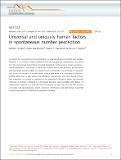Universal and uniquely human factors in spontaneous number perception
Author(s)
Ferrigno, Stephen; Jara-Ettinger, Julian; Piantadosi, Steven T.; Cantlon, Jessica F.
DownloadUniversal and uniquely.pdf (1.012Mb)
PUBLISHER_CC
Publisher with Creative Commons License
Creative Commons Attribution
Terms of use
Metadata
Show full item recordAbstract
A capacity for nonverbal numerical estimation is widespread among humans and animals. However, it is currently unclear whether numerical percepts are spontaneously extracted from the environment and whether nonverbal perception is influenced by human exposure to formal mathematics. We tested US adults and children, non-human primates, and numerate and innumerate Tsimane’ adults on a quantity task in which they could choose to categorize sets of dots on the basis of number alone, surface area alone or a combination of the two. Despite differences in age, species and education, subjects are universally biased to base their judgments on number as opposed to the alternatives. Numerical biases are uniquely enhanced in humans compared to non-human primates, and correlated with degree of mathematics experience in both the US and Tsimane’ groups. We conclude that humans universally and spontaneously extract numerical information, and that human nonverbal numerical perception is enhanced by symbolic numeracy.
Date issued
2017-01Department
Massachusetts Institute of Technology. Department of Brain and Cognitive SciencesJournal
Nature Communications
Publisher
Nature Publishing Group
Citation
Ferrigno, Stephen; Jara-Ettinger, Julian; Piantadosi, Steven T. and Cantlon, Jessica F. “Universal and Uniquely Human Factors in Spontaneous Number Perception.” Nature Communications 8 (January 2017): 13968 © 2017 The Authors
Version: Final published version
ISSN
2041-1723